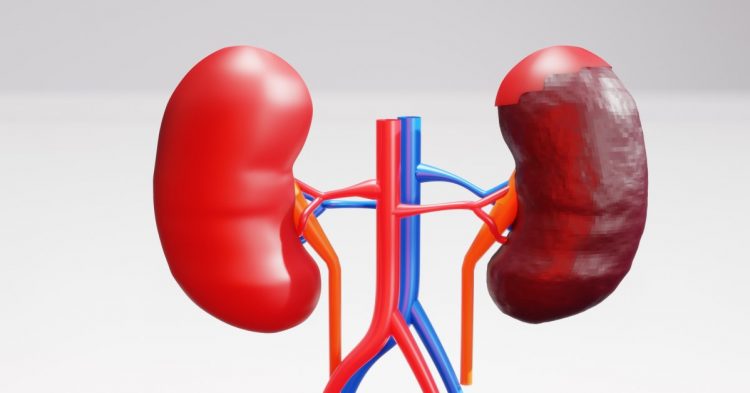Dr. David McDermott started treating people with kidney cancer in the 1990s. Back then, he says the prognosis for most of his patients with advanced disease was dispiritingly grim. “We had very few treatment options, and the survival for patients was a year or less,” he recalls. “Radiation and chemotherapy were tried, but they didn’t work.”
Things began to change when researchers discovered that kidney cancers were highly “angiogenic” compared to most other forms of cancer, meaning that kidney tumors are rich in blood vessels. This insight supported the development of angiogenesis inhibitors, a type of drug that cuts off the blood supply to these tumors. “These drugs were very effective because of the biology that drives most kidney cancers,” says McDermott, a professor of medicine at Harvard Medical School and a cancer specialist at Beth Israel Deaconess Medical Center in Boston. Life expectancies doubled—a great leap forward, but one that still left plenty of room for additional improvement.
A more significant breakthrough—one that some cancer researchers say has revolutionized the treatment of kidney cancer—arrived just a decade ago. “The big innovation that changed things was immune checkpoint inhibitors,” McDermott says. Many cancers, including kidney cancers, have built-in defenses that allow them to repel the human immune system’s attacks. Immune checkpoint inhibitors help thwart these defenses. “If you think of a tumor’s defense against an immune attack as barbed wire, this class of immunotherapy drugs aims to cover the barbed wire and allow the immune system to do its job,” he explains.
Kidney cancers are among the top 10 most common cancers in both men and women: about 79,000 new cases will be diagnosed in 2022, according to the American Cancer Society. When the cancer is first diagnosed, more than 20% of patients already have advanced disease, meaning the cancer has spread beyond the kidneys. Even among those whose cancer is confined to the kidney and who undergo surgery, 30% will eventually develop metastatic disease.
Immune checkpoint inhibitors remain one of the primary treatments for kidney cancers, and recent developments in the science of these drugs remain a big story in treatment advancements. But it’s not the whole story. Here, McDermott and other experts described the current care landscape, including the latest innovations.
Unshackling the immune system
Thirty years ago, the American immunologist Jim Allison led research efforts that revealed the existence of immune checkpoints. Specifically, he and colleagues found that a protein on the surface of immune system T cells acts as a checkpoint, or brake, to prevent an overzealous immune system response.
Allison’s work led to the discovery that cancer cells take advantage of these checkpoints in ways that allow them to limit or evade the human body’s built-in protections. These insights have led to the creation of medicines that have changed the face of cancer care, including for kidney cancers. “The work of professor Jim Allison opened the field for immune checkpoint inhibitors and other immune therapies, which has led to the golden era of immunotherapy that we’re now seeing,” says Dr. Nizar Tannir, an oncologist and cancer researcher at the University of Texas MD Anderson Cancer Center in Houston. The U.S. Food and Drug Administration (FDA) approved the first immune checkpoint inhibitor for the treatment of kidney cancer in 2015. Since then, more of these drugs have received FDA approval. They target CTLA-4, PD-1, and PD-L1—proteins on immune cells that can limit the immune system’s attacks against cancer cells.
Even among people who don’t have metastatic kidney cancer, immune checkpoint inhibitors are now being tested as a therapy after kidney surgery. “Patients with kidney cancer that is confined to the organ usually undergo nephrectomy,” Tannir says, referring to a surgery that involves the removal of the kidney. “Just last November, the FDA approved pembrolizumab in patients who have a high risk of relapse after nephrectomy.” That approval came after a clinical trial showed that patients who got pembrolizumab were significantly more likely to be alive and disease-free two years after surgery compared to those who got a placebo.
While immune checkpoint inhibitors began as “second-line” therapies, to be used only after other treatments have failed, they’re increasingly being used as first-line therapies. “This is probably the biggest innovation of the last five years,” McDermott says. One of the interesting things about immune checkpoint therapy, he explains, is that some of the best-responding patients are the ones with the most aggressive tumors. “This is the opposite of what you would see with chemotherapy, where patients with more indolent tumors often benefit more,” he says. Why does this happen? One of the theories is that aggressive cancers may look very different than normal tissues, and so the immune system, once its brakes are released, is better able to locate and attack these tumors. Because some kidney cancers are fast-developing, starting immune checkpoint therapy as soon as possible can be preferable. “By giving immunotherapy early, as first-line treatment, more patients are not dying early,” he says.
Another advancement in immunotherapy involves using combinations of these drugs—either with one another or with other kidney cancer medications—instead of deploying them alone. Right now, McDermott says it’s more common to combine a single immune checkpoint inhibitor with the older class of kidney cancer drugs (the angiogenesis inhibitors). “This is a fusion of the old first-line therapy—the blood vessel-targeting drugs—with the new first-line therapy,” he says. “When you put them together, most of the benefit is additive, but in some patients it can also be synergistic.” In other words, the drugs may work better together than either would be when used independently.
While using two or more immune checkpoint inhibitors in combination is less common, some combinations are approved for use in both the U.S. and Europe. McDermott says he’s a proponent of this approach despite the greater potential for adverse reactions. “Blocking two of these immune checkpoints instead of one can dramatically increase the immune response to both the tumor and to normal tissues,” he says. “So it appears to increase the chances of disease remission, but it also increases the chances of toxicities.”
How much does that risk of toxicity increase? When taking one immune checkpoint inhibitor, he estimates that roughly 1 in 10 patients is forced to stop the treatment due to side effects, which can include joint pain, gut dysfunction, and other debilitating symptoms. This rate doubles to 2 in 10 when a second immunotherapy is added. Even short of having to stop treatment, the side effects tend to be more severe when someone is taking multiple immunotherapies. “It really comes down to philosophy of the appropriate goals of therapy,” he says. “Most oncologists don’t think kidney cancer is a curable disease.” As a result, he says they tend to opt for drug combinations with a milder side-effect profile and good near-term results. “I would argue that the longer-term outcomes are better with a combination of immune checkpoint inhibitors, but comparative trials are warranted to formally resolve this important debate,” he says.
Other experts share his view that combinations of immune therapies may provide the best chance for long-term survival. “If you look at median survival 10 years before the first immune checkpoint inhibitor was approved, clinical trials reported median overall survival of 20 to 30 months for patients with newly diagnosed metastatic cancer,” says Dr. Martin Voss, a clinical director and kidney cancer specialist at Memorial Sloan Kettering Cancer Center in New York City. Citing the latest research on combination treatments using immune checkpoint inhibitors, he says median survival is estimated to be 50 months or more for most patients. “So that’s almost double what it was, and a much higher percentage of patients are able to achieve complete remission,” he says.
This last point hints at a compelling area of kidney-cancer research. Why do some patients respond so well to the current drugs—in some cases, the cancer is eradicated—while others don’t? Advancements in tumor profiling and kidney cancer biomarkers—a catchall term for the cancer’s traits or characteristics—may help solve this puzzle.
Read More: Coping With the Side Effects of Kidney-Cancer Treatment
Unmasking the enemy
A major theme in cancer research—and not just for kidney cancers—is the recognition that the disease is highly variable. Voss says that kidney cancer comes in different “flavors,” or molecular subtypes, that help experts understand how the cancer evolves and why it may respond to different types of treatment. By studying kidney cancer biomarkers, he and other experts hope they’ll be able to better predict which patients do best on specific drugs or drug combinations.
“Some tumors seem to be more dependent on metabolism being changed in certain ways, while others are greatly dependent on tumor vasculature,” he says. Understanding these sorts of variations and their treatment ramifications, and also identifying ways to assess the presence of these variations in people with kidney cancer, is critical to improving outcomes. Scientists are studying how to better address these variations “to match people with the right treatment,” he says.
Kidney biomarkers and subtyping can also help improve the science of targeted therapies (including immunotherapies) for kidney cancer. “If you understand what’s happening on the surface of the cancer cells, you can deliver much more directed therapies and achieve a much more potent immune response,” Voss says. For example, chimeric antigen receptors, or CARs, are molecularly engineered proteins that are designed to bind to a cancer cell (but not healthy cells) and summon an immune response. While these have been used successfully for other cancers, they’ve only recently made their way into clinical kidney cancer trials. “The whole field is holding its breath for those results, which we should have in the next year or two,” he says. These could provide another big leap forward in kidney cancer treatment.
Read More: 4 Important Steps to Take After a Cancer Diagnosis
More reason for optimism
There’s a lot more going on in kidney cancer care. McDermott says another promising advancement involves a class of drug known as hypoxia inducible factor (HIF)-2α inhibitors. HIF-2α helps cancerous tumors develop new blood vessels, use nutrients more efficiently, and otherwise adjust in ways that support their spread and survival. HIF inhibitors are drugs that can block all of these adjustments. “Early results of these HIF-2α agents are encouraging,” he says. Meanwhile, he says that many novel immunotherapies and targeted therapies are also in development.
Taking a 10,000-foot view, it appears that the treatment foundations have been laid—and in some cases, impressively built upon—that will eventually lead to reliable remission for most people with advanced kidney cancers. Already, once-deadly cancers are being succesfully treated. Looking ahead, the evolution of cancer subtyping and biomarker mapping should help ensure that patients are given the most effective drugs with the lowest risk of side effects. Considering how dramatically the treatment picture has changed in just the last five or 10 years, there’s reason to expect more significant advancements in the near future.
As MD Anderson’s Tannir says, “There is more hope than ever for patients to have improved survival, and even a complete and durable remission with the potential for cure.”
More Must-Read Stories From TIME
Source by time.com











